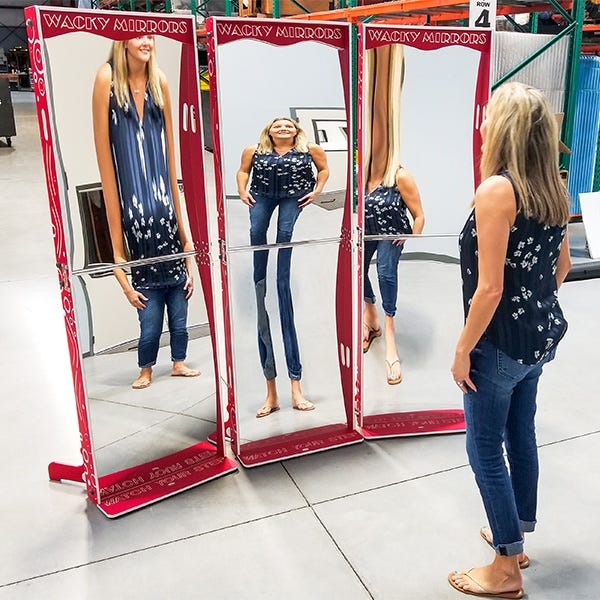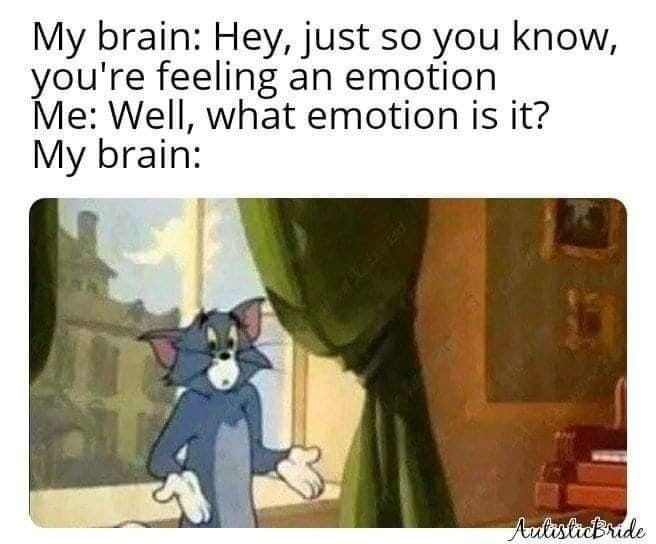Emotions vs. reality
Why your feelings aren't real, even though they feel real. Plus, Brooke's brush with death in Uganda, Descartes vs. a firefighter, and California vs. Saudi Arabia.
Imagine a fictional rich American girl called Brooke. Brooke grew up in New Haven, Connecticut, with a wealthy family that paid for everything she wanted to do. Private school, music lessons, chocolate ice cream — if Brooke wanted it, she got it.
All of Brooke's biggest problems in life had to do with either a) getting into college or b) navigating her social environment. She spent her time worrying about getting good grades in her classes, improving her SAT scores, having activities that looked good on a college application, getting her friends to like her, getting boys to like her, and deciding which boys she liked.
Brooke's life revolved around getting good grades and navigating her social environment. Getting good grades and navigating her social environment was so intensely real to Brooke that it often depressed her. Twice — once when her boyfriend cheated on her, and once when she failed an algebra test — she believed that her life was ruined, and she started thinking about ways to kill herself.
Luckily, Brooke got over her depression both times and made it to her college graduation ceremony, after which she joined the Peace Corps. She joined the Peace Corps partially out of a desire for something more "real" — she was bored of New Haven, she was bored trying to get good grades on tests, and she was bored trying to popular boys and girls to like her. Also, Brooke secretly wanted to appear saintly and compassionate to her friends in New Haven, and joining the Peace Corps seemed like the perfect way to do this.
The Peace Corps sent her to the countryside in Uganda, where she caught a nasty case of malaria.
Her supervisor decided to move her to a hospital in Kampala, Uganda’s capital. But a rebel group mistook Brooke’s vehicle for a military liaison vehicle and opened fire. The driver swerved off the road, flipped the vehicle over, and died on impact, as did Brooke's supervisor. Brooke was the only one to survive the crash, but she broke both her legs.
She crawled out of the vehicle and laid on the side of the road, where a couple of local villagers found her. They brought her back to their grass hut, and started performing their culture's version of medicine on her. They didn't speak any English, but they were kind: they brought her food and water, and they tried their best to tell her their names and their tribal customs.
Brooke spent most of her time lying on the dirt floor of the village's sick hut, throwing up, losing weight quickly, and desperately hoping she wouldn't die.
Laying on the floor and losing her strength, she began to see her whole life in Connecticut — her constant obsession with grades and test scores and boys and social climbing — as meaningless. Here in front of her was real suffering. She was suffering, the people around her barely had enough to eat, and only a miracle would save their lives.
Brooke got lucky: that miracle happened to her. Someone from the Peace Corps tracked her down and took her to a real hospital, where she made a full recovery.
When she was ready to work again, she worked twice as hard, with more wisdom and compassion than before. Now that she knew what real suffering was, she viewed it as her duty in life to ease and end it wherever she could.
Emotions vs. Reality
Each of us lives in 2 worlds. We live in the external world, which is composed of our friends and food and car crashes and war and disease and poverty and sex and everything else.
We also live in our internal world. That world is composed of chemicals like serotonin and dopamine that make us feel emotions like fear and greed and love and compassion.
Brooke's internal world in high school had to do with her grades and social life. If she flunked a test, a boy she liked didn't ask her to prom, or one of her friends was spreading rumors about her, it would seem like a huge deal. She might run home crying, get angry, or get so depressed that she wouldn't want to get out of bed.
When she was dying of malaria, Brooke's internal world had to do with her dying of malaria. She felt profoundly scared and alone. Her emotions were just as intense as they were in New Haven, but now they were telling her about something much, much bigger.
What does the world in our heads have to do with the external world? Rene Descartes would tell you that there's no way to know for sure that what you're seeing is reality. Meanwhile, a firefighter, soldier, or anyone with an extremely practical high-stakes job would tell you that nobody has time for Descartes's philosophy and you have to just trust that what you see is real.

My argument in this article is somewhere in the middle. The world inside our heads is supposed to represent the external world. That's why we evolved it — it tells us what's going on.
But the world in your head can't tell you everything.
Animals evolved emotions in order to evaluate things that are relevant to our survival and reproduction. When we see a big patch of berries or an opportunity to make a bunch of money, we feel greed. When we get close with a good friend or romantic partner, we feel love and compassion. When we see a tiger or a guy with a knife in a dark alley, we feel fear. Et cetera.
The problem is that a lot of our evaluations are wrong.
A great example of this is depression. When you're depressed, your mind starts warping the world to make everything negative. There are multiple ways of interpreting everything that happens: if your friend isn't returning your calls, it might be because he's busy, or it might be because he doesn't want to hang out with you anymore. When you're depressed, you're more likely to believe he doesn't want to hang out with you anymore.
Another good example is pain. Pain is generally a sign of danger. If you touch a hot stove and feel pain, you should probably pull your hand away! But pain can also be a sign that you're growing: going to the gym is painful, too. If you run away from all pain, you will become weak.
Pretty much all of our emotions lie to us about reality at least some of the time. Fear is supposed to be a sign of danger — but you probably feel fear during job interviews, even though nobody ever dies during a job interview. You might feel love and compassion towards someone who's about to betray you, or greed when you're about to walk into a trap. Et cetera.
Trying to understand reality by looking at your emotions is sort of like seeing the world through a funhouse mirror.
That's why a lot of ancient wisdom, plus modern cognitive behavioral therapy, tells us to question our emotions. Because your emotions lie to you.
There are 2 problems with questioning your emotions. The first is that it's hard. We evolved to treat our emotions as reality. Learning to distinguish between the two is unnatural, and most people can't do it.
This is one reason why it's so hard to reason with people. Let's say a friend of yours is angry because he thinks that everyone at his office is plotting against him and sabotaging his career.
You know that he's wrong — in fact, his boss told you in confidence that he's planning on promoting your friend. But if you come out and say "no, the people at your office aren't plotting against you," you're denying your friend's reality. Their reality is anger. Inside the world in their head, there's anger. Trying to invalidate the anger is just going to make them more angry.
The second problem with questioning your emotions is that reality is pretty brutal. The human mind is not designed to cope with reality. This is why people drink alcohol, play video games, eat at nice restaurants, go on fancy vacations at 5-star resorts, read fantasy novels, watch romance movies, watch porn, join fanatical religious and political movements, and run away from real-life death, poverty, and disease: they don’t want to face reality.
But if you don’t face reality, reality will smack you in the face.
Getting Smacked In The Face By Reality
After Brooke's time in the Peace Corps, NGO's lined up to offer her jobs. A year ago, Brooke would have told you she wanted a cozy office job, where she could sit at home, go to a few bullshit Zoom meetings, and get a cozy salary.
But after her brush with death, she wanted to do something more meaningful. So she volunteered for a more dangerous job with lower pay working for an organization she believed in more.
Brooke's brush with death in Uganda was an example of her getting smacked in the face by reality.
Before she was a rich American girl who got everything handed to her and never had to solve any of her own problems. If she got sick, her parents took her to the doctor. If she was hungry, her parents fed her. Other people always handled reality for her.
(She had a bunch of emotions left over, but they weren't telling her about real problems — they were telling her about the fake problems of high school and college.)
Then she saw reality, and all at once. She saw people living in poverty in the third world. She came close to death. And she realized that however bad her problems felt to her at the time, they were nothing compared to what she was dealing with now — and what most people have to deal with every day.
The less you face reality, the more distorted your funhouse mirror gets, and the less you're able to see reality.
This is one reason why America freaked out so much about 9/11. When there's a terrorist attack in Israel, they treat it like it's nothing. Israel gets attacked by suicide bombers all the time, and their whole policy is to try to go back to normal as quickly as possible. If a suicide bomber blows himself up in a shopping mall in Tel Aviv, 2 hours later the mall will be open for business again. In Israel, terrorism is reality.
But in America, terrorism was not reality. Terrorism was this big scary thing that happened in other places — but Americans had this idea that when they were at home, they were safe. Then a plane crashed into the Twin Towers, and they realized they weren't safe. Then they cancelled a whole week of NFL and MLB games, they started driving more and flying less, and they started two wars in the Middle East.
This is also why places like Saudi Arabia and California are so disconnected from reality. Saudi Arabia and California both have belief systems that are completely out of whack with real life — Saudi Arabia has Wahhabism and California has woke leftism. These crazy ideologies would normally cause their society to collapse, except that Saudi Arabia and California are both obscenely rich, Saudi Arabia from oil and California from tech.
As a result, Saudi Arabia and California can get away with doing really stupid things. Saudi Arabia is building an entire “line city” that’s just one road in the middle of the desert, and California has spent $30 billion to not build a high speed rail.
Because they don't have to face reality, they choose not to. The human mind evolved to run away from uncomfortable things like death and disease and poverty and pain. It takes someone extremely courageous (like Brooke) to run back into reality after getting smacked in the face by it

The other way you can get smacked in the face by reality is if other people around you start calling you on your bullshit. This is one reason why people who live by themselves are more likely to go crazy: they have no one to pull them back to the real world.
Japan, an island country, had this problem during World War II. They had a culture which made it extremely taboo to criticize the government, meaning no one could speak out against the war. Because they were an island, they were culturally cut off from the rest of the world, which was saying how crazy they were.
As a result, they became the nation-state equivalent of a mental patient in solitary confinement. They convinced themselves that they could defeat America in a war, which was impossible. Then, America dropped atomic bombs on Hiroshima and Nagasaki, smacking Japan in the face with reality — Japan surrendered a few days later.
Questioning Your Own Emotions
Earlier in the article I mentioned that the key to solving the emotion problem is to question your own emotions.
How exactly do you do that? A good first step is to simply be aware of how you feel. Practice scanning your body and describing how you're feeling. Science shows that simply recognizing your emotions can make them less powerful.
Don't get attached to your emotions. If you feel something like anger or shame, don't identify with the feeling. Describe your emotions by saying stuff like "there's a lot of anger inside me" rather than "I am very angry".
View the emotion as an external invader brought on by the chemistry in your brain, not as a part of you or a logical reaction to whatever's taking place in the outside world.
Then, look for evidence against whatever your emotion is causing you to believe. Make the counterargument against whatever thoughts are currently running through your brain. By making the counterargument, you'll be a little bit closer to seeing whatever truth it contains.
For example, if you're depressed because you feel lonely, make a list of all the people in your life who appreciate you and care for you. You will probably find that the list is longer than you think.
Or if you're angry at your wife, make a list of everything you love about her. You probably married her for a reason. Try to remember what that reason was, and then focus on that instead of the thing that's making you angry right now.
Also, give yourself a difficult goal that you will have to suffer to attain. The suffering will make you more mature and wake you up to reality, as it did for Brooke.
If you can't give yourself a difficult goal, the next best thing is to read Russian literature. If you haven't suffered yourself, you can at least get some second-hand suffering by reading Dostoyevsky.
Handling Other People's Emotions
The key to handling other people's emotions is basically the exact opposite of handling your emotions. When dealing with someone else, you have to (in most cases) validate their emotions, even if their emotions are stupid and wrong.
That's because if you try to invalidate their emotions, they'll get angry and stop listening to you.
Once you validate their emotions, then you can use conversational judo moves to invalidate them and help them see things your way.
You can use a tactic that Jordan Belfort, the sales trainer most famous for being the "Wolf of Wall Street", uses. In his sales book Way Of The Wolf, he describes a situation where his son got angry at another kid on his soccer team and screamed at him. His wife tried to calm him down — but no matter what she said, her son just got angrier and angrier.
So in comes Jordan Belfort, who starts the conversation by screaming about how he's also angry about his son's teammate's behavior. "He's a ball hog!" shouts Belfort. "Yeah!" agreed his kid.
Then Belfort switches to a calm tone and explains why it’s wrong to scream at other players on your team, even if you’re not happy with them. The kid feels like he’s being listened to and his emotions are being validated, so he agrees.
Hey! Thanks for reading.
My name's Theo, and every other Monday I publish an article like this one about whatever was on my mind the week before. Usually it has something to do with human psychology or long-term trends in society.
If you liked this article, there's more where it came from. You may enjoy this article about how people are monkeys pretending to be robots:
People are monkeys pretending to be robots
Imagine that you’re sitting in a boardroom. You’re on the 69th floor of a skyscraper in downtown Manhattan. You look out the window and you see the Hudson River, plus the high floors of other nearby skyscrapers.
Alternatively, feel free to hit the purple "subscribe now" button, and you'll start seeing more of my posts:
Happy trails!










I think it has to do with the Maslow pyramid. People in poverty tend to be lower on the pyramid because starvation is always a possibility. Same can be said for countries in the midst of conflict. When you don't have to worry about survival, you start thinking about fitting in and self expression.